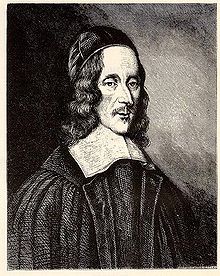George Herbert
| George Herbert | |
|---|---|

Portrait by Robert White in 1674 (National Portrait Gallery)
|
|
| Born |
3 April 1593 Montgomery, Wales |
| Died | 1 March 1633 (aged 39) Bemerton, Wiltshire, England |
| Alma mater | Trinity College, Cambridge |
| Occupation | Poet, priest, theologian, orator |
| Notable work | The Temple, The Country Parson, Jacula Prudentum |
| Style | metaphysical poetry, theology |
George Herbert (3 April 1593 – 1 March 1633) was a Welsh-born poet, orator and Anglican priest. Herbert's poetry is associated with the writings of the metaphysical poets, and he is recognised as one of the foremost British devotional lyricists."
Born into an artistic and wealthy family, Herbert was largely raised in England and received there a good education that led to his admission in 1609 as a student at Trinity College, Cambridge. He went there at first with the intention of becoming a priest, but when eventually he became the University's Public Orator he attracted the attention of King James I. In 1624 and briefly in 1625 he served in the Parliament of England.
After the death of King James, Herbert's interest in ordination renewed. In his mid-thirties he gave up his secular ambitions and took holy orders in the Church of England, spending the rest of his life as the rector of the little parish of St Andrews Church, Lower Bemerton, Salisbury. He was noted for unfailing care for his parishioners, bringing the sacraments to them when they were ill, and providing food and clothing for those in need. Henry Vaughan called him "a most glorious saint and seer". Never a healthy man, he died of consumption at the early age of 39.
Herbert's religious poems are characterized by a precision of language, a metrical versatility, and an ingenious use of imagery. Many have been set to music, some as hymns that still remain popular. Another formed the basis of the prayer by which he is now commemorated in the Church of England.
George Herbert was born 3 April 1593 in Montgomery, Powys, Wales, the son of Richard Herbert (died 1596) and his wife Magdalen née Newport, the daughter of Sir Richard Newport (1511–70). He was one of 10 children. The Herbert family was wealthy and powerful in both national and local government, and George was descended from the same stock as the Earls of Pembroke. His father was a Member of Parliament, a justice of the peace, and later served for several years as high sheriff and later custos rotulorum (keeper of the rolls) of Montgomeryshire. His mother Magdalen was a patron and friend of clergyman and poet John Donne and other poets, writers and artists. As George's godfather, Donne stood in after Richard Herbert died when George was three years old. Herbert and his siblings were then raised by his mother who helped push for a good education for her children. Herbert's eldest brother Edward (who inherited his late father's estates and was ultimately created Baron Herbert of Cherbury) became a soldier, diplomat, historian, poet, and philosopher whose religious writings led to his reputation as the "father of English deism".
...
Wikipedia
